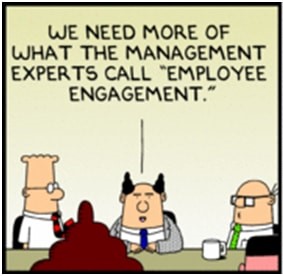 Reading Time: 3 minutes read
Reading Time: 3 minutes readOrganizations and their leaders are facing many challenges in the business world that is characterised by workplace ambiguity, adjustments and anxiety. However, one of the most important issues is that of employee engagement at workplace. At a time when more and more millennials are replacing baby bloomer era workers, it has become more important than ever to ensure strong and healthy relationships between employers and their employees.
The “millennial workforce” effect
This is particularly so, given that millennials have shown a stark difference in what they consider to be a healthy workplace environment. While earlier, employees were fine with a strict hierarchy, absolute formal attire and 9-5 jobs, millennials crave for freedom of expression and creative room to expand their knowledge and work with competitively intelligent co-workers.
Employee engagement begins with trust, integrity and an open two-way communication and commitment between the organisation and its employees. In other words, it has more to do with the psychological attachment that employees feel towards their employer and the goals of the firm at large. Some call this – a psychological contract!
LEARN ABOUT: Employee Trust
The Psychological Contract and its potential
A “psychological contract” is basically a set of expectations held by an individual employee, which specifies what the individual and the organisation expect to give to and receive from each other in the course of their working relationship. It is a system of beliefs on what is expected from employees and what they will get in return from the employer, and visa-versa!
However, when it comes to anything psychological, there is opportunity to create something great out of it or cause great damage as well. Perceived breaches of the psychological contract can seriously hamper the employer–employee relationship as can particularly affect employee engagement efforts, their overall focus at work, productivity and over all ROI.
Consequences of employee dis-engagement
Disengagement often happens when leadership breaks the psychological contract and these breaches can happen because of many reasons like violations of trust and faith, actions that reveal a dishonesty and integrity, behaviours that violate ethics or the law, promises that get broken, assignments that intrude on personal time, job descriptions and expectations that are ill-defined, environments that are difficult and depressing, and it generally comes down to unclear and un-communicated assumptions and expectations
Employees tend to view their social exchange with the organization as less valuable if they perceive the organization to inadequately fulfill its commitments. On experiencing breach, employees are more likely to see themselves in a state of inequity. Employees restore equity by altering their attitudes and behaviours such as:
- Lowered job satisfaction
- Decreasing organizational commitment
- Health and well-being of employees
- Work disengagement
- Lack of Innovativeness
- Increased turnover intentions
- Organization citizenship behaviour (OCB)
- Workplace deviant behaviour
The critical need for employee engagement and empowerment
To motivate employees to contribute more, companies have to establish a clear psychological contract with their employees and showcase their sincerity towards it thorough consistent and impactful employee engagement survey. Employers must do things like treating employees with respect and dignity, offering opportunities for promotion, training and development, career growth, no discrimination etc. The fulfilling of this informal contract will result in many benefits to the organization like engaged workforce, showing loyalty and increased commitment towards organization, increased productivity and less absenteeism. It is very essential for all the organization to meet these unwritten expectation of the employees because “happy employees is always productive employee”.





















